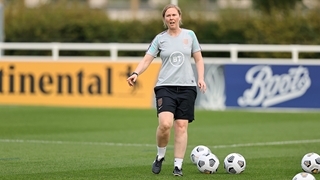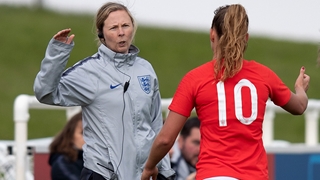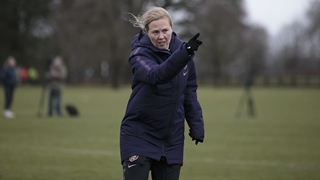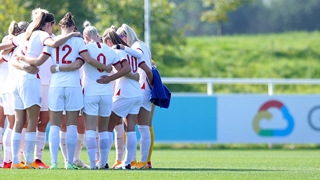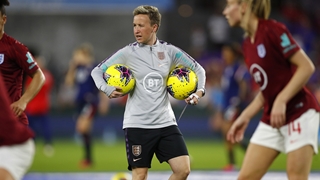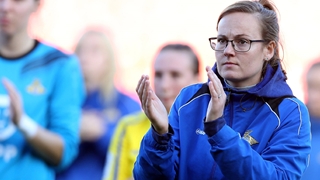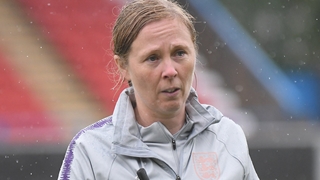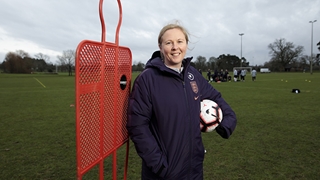
Firstly, congratulations on your new role Rehanne. It was your first camp last month, how was that?
I really enjoyed it. We’ve all been desperate to get back on the grass and it’s been such a long time out because of the pandemic, so it was a good for us to be back there as a collective. There are obviously some new faces with staff and players so I think it was quite fresh for everyone and with three major tournaments in everyone’s sights I think everyone was really positive and excited to be together.
Knowing a few of the girls from development squads and prior to that must’ve helped the transition for you and them?
Of course, I think knowing some of the characters and personalities obviously helps connect more quickly with the team which is vital in international football with not a lot of time together. Over the last few years, I've been working with the younger players in the pathway where we’ve been trying to develop their overall game on and off the pitch and preparing properly for those top-end games, developing their resilience and becoming tactically knowledgeable and adaptable. So all of the work that’s gone on previously with a number of youth coaches has given them the platform to step into that squad and do well. I’ve also worked with a lot of the more established senior players over the years, either through the youth teams which I've been involved with since 2006 or at club level in the WSL, so in that way it’s been great to reconnect and also get to know those few I'm less familiar with.
We have a game later this month with Germany, so everyone must be raring to get going again after everything that’s gone on…
The last game was in March, so there’s already an excitement in the camp leading into this one from the conversations we’ve had with some of the players on and off camp. They can’t wait to get back on the pitch and for us as coaches, we’re looking at opportunities to see people play and how they handle those environments while also thinking further down the line and to those tournaments we know are in the future. Germany is the start of a longer journey that enables us to test where we are and gauge what needs to happen next for us to get to that winning stage in a major tournament.
Over your career, you’ve had so much experience, whether that’s from working with centre of excellence and academy and first team at Leicester, right up to your time with Arsenal and England…
Yeah it’s been a brilliant journey – there’s been a lot of ups and downs, but that’s football all over and I’ve been fortunate to have some real highs. I think for me, I made a lot of career decisions in order to stay on the grass because where teams were concerned, I started coaching at a time when players would pay to play and coaches had full-time jobs not with teams. So we were doing all of the team work in the evenings and at the weekend because there were no jobs to do it full time. I wanted to work with players, develop my detail and knowledge and learn from as many people as possible so I could be as effective as a coach and manager on the grass. So during my time at Leicester and Arsenal, it was an add-on to my full time role as a Football in the Community manager. The women’s game has changed so much over the last 20 years for the better, we're in a much better place now. Being full time back at the FA with an increased resource and dedicated team of experts allows you to focus on managing the development and performance of players, multi-disciplinary team, building relationships with club managers and those collaborative skills to benefit the players who are at the centre of everything we do. I think over time, I’ve been really fortunate to only ever work in football and to be full time in international football over the last five years. I've been able to just focus on football and gaining experiences across a variety of environments and countries which I hope to use to the benefit of the Lionesses this year.
What’s your coaching philosophy?
From my perspective, relationships and creating the best possible environment for players to thrive is paramount. It’s got to be a player-centred approach to ensure they’re in a position to perform at their best but in order to be successful there has to be challenge, competitiveness and a work ethic instilled. For me, one of the key factors is that it’s about establishing a common goal and finding ways to get everybody on board so you need to know where they’re at and what they want to get out of the game and how they feel they can contribute to the team the best. So building relationships with players is absolutely key and in my role now, while I may have worked with some of the players in the past, there’s quite a few that I haven’t worked with in a long time so for me to support them as best as I can, I have quite a lot of work to do to build those relationships. It’s a positive thing and it can only help me to support them and challenge them to get the best out of themselves as we want to progress as a team.
You’ve had two spells with the FA, you must have noticed a difference in the women’s game with what you helped to start ten years or so ago now starting to prove fruitful?
For sure. The resource has got bigger, but there’s a lot of people who’ve worked behind the scenes for many years battling to develop the women’s game, a lot of pioneers and people who felt it should be invested in. One of those people was Hope Powell who gave me an opportunity to coach internationally after watching a session I delivered on a mentoring scheme via the FA and Brent Hills, who has also been instrumental in a lot of coaches' development. I was then a consultant member of staff, as I had a full-time job at Leicester so I was doing those bits alongside it. Now, we’re in a position where it’s an exciting time ahead because we’ve looked at and analysed what the best in the world is like and what it’s going to take to bridge the gap and while we're in difficult times at the moment, we are still in a better position than in 2006. You only have to look at St. George’s Park and the multi-disciplinary team we have around the squad to provide expert support to players and that’s something which people fought for, for many years. The evolution of the WSL is challenging players weekly, we have built a significant fan base and have visible female role models as players, coaches and commentators that is all helping England teams move forward. Now we’re at a point where we know where we stand and what it’s going to take. We’re in the driving seat and it’s about pushing on now to go and try to win a tournament and I’m really grateful to continue being a part of what we do here.
Have there been any moments in your career, good or bad, that you always refer back to and reflect on what you learned?
When I was developing a team at Leicester, that was my first managerial experience after transitioning from player to coach. During that period the game wasn’t professional so player management was really challenging at times because I had a really clear philosophy on what I wanted things to look like in order for us to be successful. Looking back, I learnt a lot about how to work with players and involve them in the journey, I took psychology courses to help me to drive performance in individuals and as a team because I realised quickly it couldn’t be me driving the bus all the time if we were going to compete in the top league. It was a really good learning stage for me, I had a good four years of learning, making mistakes and finding solutions which I feel have helped me evolve. Going from there to Arsenal in an assistant coach role, I went from leading and managing to then doing everything I could to support the manager at the time, which was Laura Harvey. We were working with world class players - Champions League winners, a squad of players with over 500 caps between them and competing in the Champions League and what was the first season of the WSL with high expectations from the players themselves and the club – I loved it. They had a culture of winners, with no excuses and that for me was a difference in terms of the understanding of the players in going from one environment to the other. On the back of that, I’m comfortable with the challenge that senior players bring, I've worked in a few environments since then with big characters, with lots of experience and knowledge in the game, ultimately as a coach you are there to help, everyone wants to win at the end of the day, so its ok to have a challenge in the environment, it's healthy and the good and the bad shape you if you reflect on the experiences properly and learn from them.

